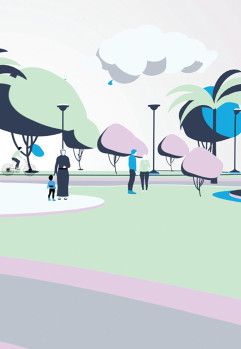Dubai: A City That Gets Smarter Day by Day
When His Highness Sheikh Mohammed bin Rashid Al Maktoum, Vice President and Prime Minister of the UAE, and Ruler of Dubai, announced in 2013 his plan to make Dubai a model ‘Smart City’, nobody envisioned just how far it would go. Today, Dubai rubs shoulders with countries that embrace artificial intelligence (AI) to provide ‘seamless, efficient, safe, and personalized’ services to its population.
Sheikh Mohammed’s vision was to transform Dubai into a Smart City by 2021 and to foster a generation equipped to meet the challenges of the future with the help of science and technology. As of 2019, we have witnessed a true technological revolution in the emirate, with smart services operating across government departments and in a vibrant public transport system.
Visit any kiosk, you will be amazed at how smart Dubai has become, how you can deal with day-today affairs in a smarter way. For example, you can renew your car registration card in one minute by visiting a Roads and Transport Authority kiosk.
Sheikh Mohammed’s vision was for all government offices to be digitized by 2017 under six key pillars: transport, communications, infrastructure, electricity, economic services, and urban planning. The idea was to give people access to high-speed wireless internet connections, enabling them to receive government services through their smart devices.
Though the original goal was to link the departments and entities of the government of Dubai to provide seamless services to the public, it evolved into be a project that would make Dubai “the happiest city on the earth.”
To meet the goal, in 2014 he announced 100 initiatives covering the six key pillars and set a target of 1,000 government services to go smart within three years.
The Smart Dubai 2021 initiative is the emirate’s roadmap to becoming an ‘intelligent, responsive and personalized city of the future.’ The ultimate aim is to foster smart living, smart economy, smart governance, smart mobility, smart environment, and smart people by 2021.
Features of the Dubai Smart City initiative
• Free Wi-Fi in public areas.
• Dubai Design District, a public platform for companies to facilitate their transactions such as licenses, visas, and other government services.
• 5-D control room used to manage the process of transforming Dubai into a smart city. It also monitors the government projects and service indicators, roads, weather conditions, and emergency situations etc.
• Electric car charging stations that would boost the use of environmentally-friendly cars.
• The smart parking system to tell drivers about the availability and location of parking spaces.
• Live traffic monitoring to help residents plan their journey before leaving their homes.
• Smart meters and smart power grid to help customers monitor their power and water use in real time, and unused solar energy.
• Open global laboratory to promote science among residents.
• My Window to Dubai program to share information on government entities, schools, hospitals, roads and transport, sensor systems, buildings, energy and others.
• I-Dubai program to provide information on municipal services.
• Smart parks and beaches project to provide information on weather conditions, sea, temperatures, and public safety guidelines.
Meanwhile, Smart Dubai signed a Memorandum of Understanding (MoU) with the Dubai Financial Services Authority (DFSA) to facilitate these smart transformation initiatives and empower residents to make use of the technology innovation.
The MoU complements ongoing DFSA initiatives by driving organization-wide digital transformation and contributes to Smart Dubai’s startup support initiative for entrepreneurs.
At the MoU’s digital signing Wesam Lootah, Chief Executive Officer of Smart Dubai Government Establishment, said: “The collaboration of public and private sector entities, specialized in all economic sectors, is central to achieving the smart city vision outlined by His Highness Sheikh Mohammed bin Rashid Al Maktoum, Vice President and Prime Minister of the UAE and Ruler of Dubai. The MoU with the DFSA will further accelerate the digital transformation by covering areas related to data science within the financial services sector.”
Through the MoU, the DFSA will also promote the Dubai Paperless initiative to support Dubai government’s aim to become completely paperless by 2021.
Other projects & initiatives
Some projects that predated the Smart City initiative are also playing an important role in making Dubai a smart city. These include: the Radio Frequency Identification-enabled Salik, a road toll system introduced in 2007; Smart Nol Card, a unified payment card that can be used across the public transport network; RTA eWallet, an online payment system; and QR code to locate addresses.
HERE ARE SOME OF THE PROJECTS THAT STARTED AFTER THE ANNOUNCEMENT OF THE SMART DUBAI INITIATIVE:
• Makani, a smart address system under which buildings are assigned a unique 10-digit number that can be used to search the location through Google Maps.
• Environmentally-friendly electric bikes for patrolling announced by Dubai Police in 2014.
• Happiness meter.
• Dubai Data initiative, the most comprehensive city-wide database across the public and private sector.
• Smart Dubai Index, a set of indicators that highlight the achievements of Dubai.
• Sustainable cities that conserve energy and harness renewable energy.
• Dubai government apps that provide instant digital access to over 50 government services.








